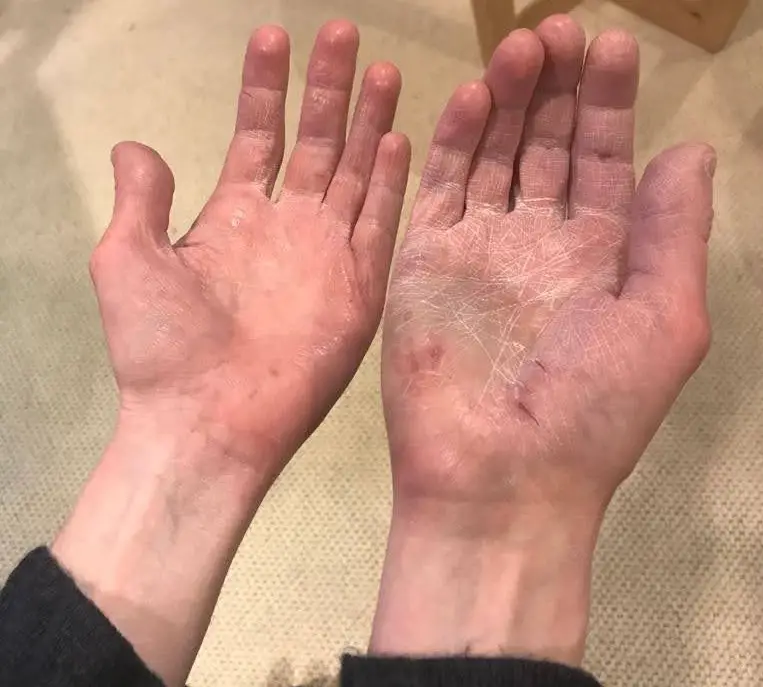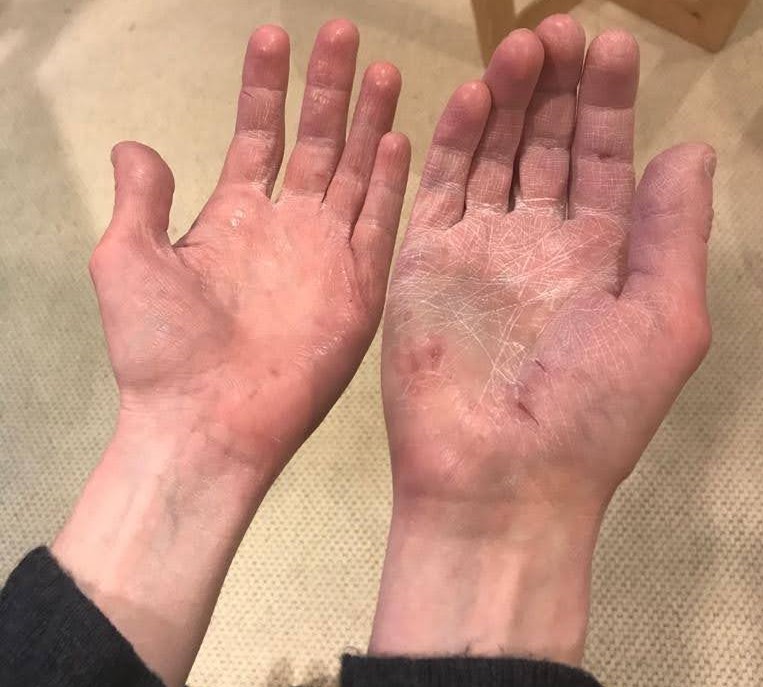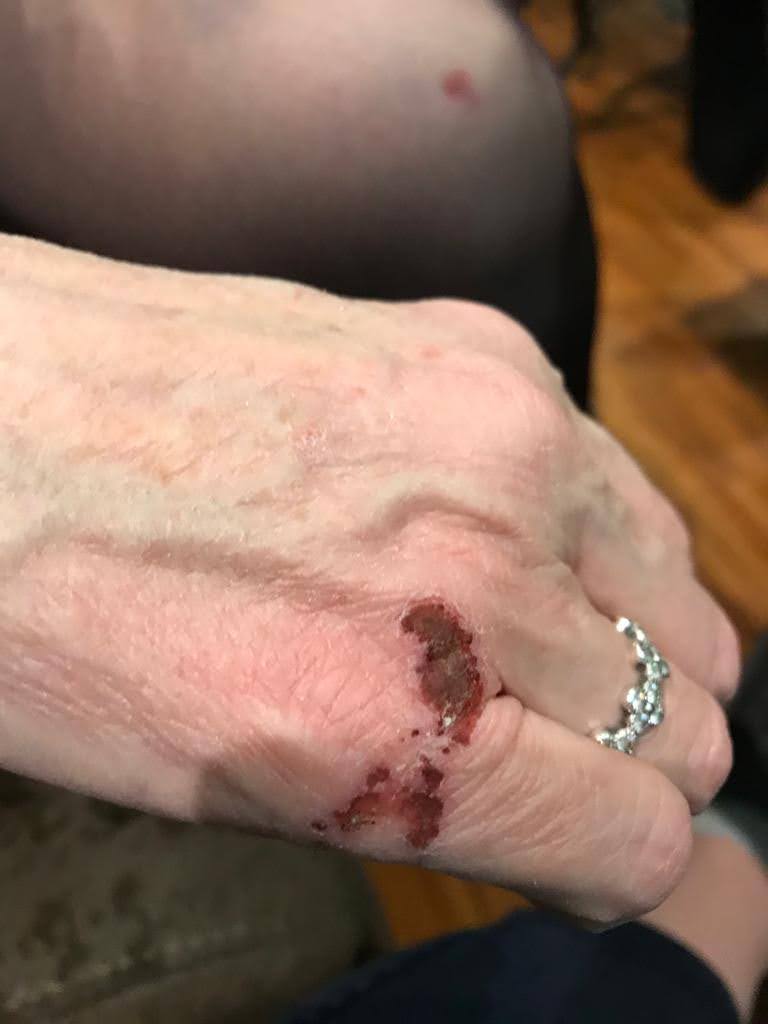
June 16, 2020 – Four months after terrifying bura wind blasted through Dalmatia at 270 km/h, TCN received a message from two travellers who experienced the bura in the worst way imaginable.
Alicia and Diana were on RSD Travel’s one-week tour of Croatia, Bosnia and Herzegovina, and Montenegro. They travelled from London to Dubrovnik on February 4, 2020. Unfortunately, due to the strong bura winds, the plane was unable to land at Dubrovnik Airport (it was due to arrive at 21:00), and the flight was diverted to Split. Since the accommodation for the first night of the tour was in Dubrovnik, not Split, they were taken by coach to Dubrovnik, arriving at about 3 am. On February 5, they explored Dubrovnik’s old town, and then Ston, before travelling to the Romana Hotel in Makarska, where the tour group spent two nights.
When they arrived at the Romana Hotel, the tour bus stopped directly outside the hotel door because the wind was already getting very strong. As soon as they entered the hotel reception, they were informed that minibuses would transport everyone to the restaurant (even though it is only a short walk) because it was too dangerous to walk outside in the strong wind. There were also several signs up in the lifts and reception area informing everyone of these arrangements. Some commented that there must have been accidents in the past for the hotel to be taking these precautions. “It concerned us that the hotel was in the middle of a construction site and all of the building materials looked extremely unsafe and unsteady in the fierce wind, with pallets on the roof teetering on the edge, and cranes swaying in the wind,” said Alicia and Diana.
No-one in the tour group got much sleep that night because of the intense sound of the howling wind, and the feeling of the building swaying from the force of the bura. “Everyone was terrified that the windows were going to shatter on them during the night,” said Alicia and Diana, who in the early hours of the morning, also felt an earthquake.
It was difficult to distinguish when the earthquake occurred because the bura was so ferocious and exerted an even stronger force continuously throughout the night. During the night, there was also a very loud bang; it was not until it was light in the morning that everyone realised one of the cranes had blown over.
In the morning (February 6, 2020), the hotel staff were still taking precautions and were busy making sure people didn’t go and walk outside to go to the restaurant for breakfast. They created a walkway through the underground car park so that guests weren’t needing to go outside. Hotel staff kept people at the door until the wind died down slightly before allowing people to go from the underground car park to the restaurant.
“We went down to reception with plenty of time before the scheduled departure time for the day’s sightseeing (in Split, Trogir, and Omis)”, said the passenger, whose guide for their tour group, Hattice, said the bus was ready and ushered people out the door.
“As instructed, we went outside and walked towards the bus that was parked directly outside the door, but then realised it wasn’t our group’s bus,” said the passengers, whose bus was parked the furthest away from the door. It was past the hotel building, which meant that it wasn’t shielded from the strong bura wind, and was on a rocky gravel surface, not on tarmac.
Since several tour groups (all on the RSD trip) had stayed at the same hotel, there were three buses lined up, and due to the poor coordination of timing, all of the groups were departing at a similar time, which meant not all of the buses could be directly there waiting outside the door.
Alicia was walking to the bus; the bura’s strength increased in intensity and was still making a fierce howling sound. When Alicia had almost reached the door of the bus, there was suddenly a massive gust of wind. Despite trying to resist the pulling and pushing of the intense wind, and trying to keep her feet grounded, her entire body was lifted into the air. She was blown at a terrifying speed and then forcefully thrown down to the ground, more than 20 metres away from where she had been standing.

“I was thrown face-first, with my head hitting the ground and rebounding back, while the right-hand side of my body simultaneously bore the brunt of the impact,” said Alicia. Her initial instinct was to try to get up, but when she turned over and tried to stand up, she was knocked down once again by another gust of wind, with her head hitting the ground for the second time.
Her whole body hurt; both of her hands were grazed and bleeding, her jeans had been ripped through at the knee, and her knee was also grazed and bleeding. She was unable to move her right hand and arm. One of the men in the tour group ran towards her and picked her up and took her back to the hotel reception, where the tour guide was still directing people to go out to the bus.

She went to wash the gravel and rocks out of her hands while the reception staff looked for a first aid kit. Unfortunately, they only had limited first aid supplies and were only able to provide her with some adhesive plasters to put on the bleeding wounds on her hands. Alicia informed the tour guide that her head had hit the ground, but the tour guide shrugged it off as though there was nothing wrong. The hotel staff then took her in their arms to the bus. When Alicia got on the bus with the tour guide, they then realised that Diana had also been injured by being blown over.
Diana wasn’t aware of the incident in which Alicia had been blown over and severely harmed, as she had gone to the bathroom and went down to reception after that. The tour guide instructed her to walk the length of the three waiting buses, even though at that point, the risks were already known because Alicia had already sustained injuries.
Diana had got as far as the second bus when she was forcefully picked up by the wind and blown into the gravel. “The wind was so strong that I was hurled to the ground, face-first. With the palms of my hands facing upwards, resulting in my knuckles smashing against the rocks and stones on the surface of the ground,” said Diana, her sunglasses and scarf having been dragged some distance away by the wind, despite the fact that her scarf had been wrapped securely around her neck.

She was unable to get back up on her feet, as when she tried, the wind was so strong it kept her pinned down to the spot, making it impossible to get up. Three of the hotel staff came and helped her stand up and took her onto the bus. She was in total shock and felt sick, and wounds on her hands and knees were bleeding.
One of the fellow travellers alerted Hattice (the tour guide) to the fact that Diana had also been injured. Hattice then said she would take those who were injured to a pharmacy when they arrived in Split. Upon arrival, Hattice accompanied Diana to the local pharmacy, but the pharmacist refused to look at or treat the injuries because the wounds were open and bleeding. The pharmacy also didn’t have any bandages, so Diana purchased some adhesive plasters and antiseptic spray and was directed to the café next door to wash her wounds.
They were both left to suffer and deal with their injuries on their own. Throughout that day, Diana’s hand and knees continued to bleed. Alicia had pins and needles in her arm from her shoulder to fingers, and her wrist was at a distorted angle as though it was dislocated. The swelling in her hand intensified, and she was unable to move it in any direction and could not bend any of her fingers. She also had bruising to her right hip, thigh, knee, forehead, and face.
When they arrived back at the hotel that evening, the damage from the storm was visible. Most of the trees surrounding the hotel had been blown over or uprooted. The crane that had blown over during the night epitomised the magnitude of the danger and severity of the damage.
Although Diana’s hand was still bleeding several days later, and everyone thought Alicia’s hand/wrist was broken, they weren’t offered any medical assistance whatsoever. The tour guide/tour company didn’t offer them any chance to go to a medical centre, to see a doctor, or to go to a hospital.
After arriving back in the UK, Diana attended the Accident and Emergency department at the local hospital. X-rays revealed torn ligaments in her right knee, and an infection and foreign bodies in her left hand. Antibiotics were administered, and the following day she underwent surgery to remove the grit and clean out the wound, and five stitches were applied to close it up again. Three months after the accident, a secondary infection occurred in her hand. She still has limited movement and use of her hand and may need a second operation in the future.
Alicia went to the emergency department, and the doctor was horrified that up until that point, she had not been seen by any doctor. The question was: “These are serious injuries, why didn’t the tour company do anything?”
She required a CT scan of her head, numerous x-rays, and an MRI. Alicia was suffering from concussion and multiple fractures and damage to her tendons, ligaments, ribs and nerves in her hand/wrist/arm. Due to the COVID-19 situation, she is still awaiting treatment to repair the damage. She will probably never get the full strength, motion, or function of her hand back again. Alicia still hasn’t been able to get her hand fixed as there are several fractures and damage to the nerve.
RSD Travel did not provide any assistance during the trip and have denied any wrongdoing. They also refused to provide any compensation.
They believe that RSD Travel failed in their duty of care:
It was negligent to have the bus parked so far away from the door of the hotel. The fact that the hotel had arranged minibuses to take people from the door to the restaurant proved that the risk was known and foreseeable, and this accident could have been prevented. By having the bus parked so far from the door, it created an avoidable risk. This meant they had to walk past the hotel building to an area that was not shielded by the wind. If people had been kept in the reception area, and if the buses had been brought to the door for each group to safely get on their respective buses, this incident wouldn’t have occurred. The weather was not something that RSD Travel could control, but the tour company could have controlled the situation by ensuring that the buses were brought to the door of the hotel. Failure to do this created a foreseeable hazard that allowed the accident to occur.
Besides, it was unsafe to stay at a hotel that was still under construction and located in the middle of a building site.
Lastly, it was negligent and a failure of RSD Travel’s duty of care to not provide medical assistance on either the day of the incident or on any of the subsequent days when the severity of the injuries was increasingly evident. Not providing medical assistance could reasonably be foreseen to cause harm, given that fractures and infections are more prone to complications if not treated immediately. A pharmacy does not and cannot provide the medical assistance required to assess and treat such injuries fully.
Follow our travel page for more.








